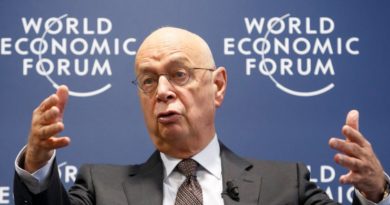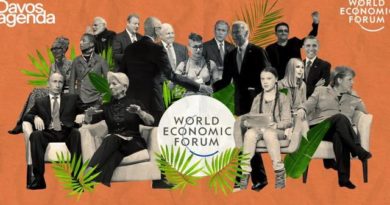How the Davos elite took back control
Guest Post by Thomas Fazi
The WEF is insulating policy-making from democracy

Thousands of the world’s global elite are convening in Davos this morning for their most important annual get-together: the meeting of the World Economic Forum (WEF). Alongside heads of state from all over the world, the CEOs of Amazon, BlackRock, JPMorgan Chase, Pfizer and Moderna will gather, as will the President of the European Commission, the IMF’s Managing Director, the secretary general of Nato, the chiefs of the FBI and MI6, the publisher of The New York Times, and, of course, the event’s infamous host — founder and chairman of the WEF, Klaus Schwab. As many as 5,000 soldiers may be deployed for their protection.
Given the almost cartoonishly elitist nature of this jamboree, it seems only natural that the organisation has become the subject of all sorts of conspiracy theories regarding its supposed malicious intent and secret agendas connected to the notion of the “Great Reset”. In truth, there is nothing conspiratorial about the WEF, to the extent that conspiracies imply secrecy. On the contrary, the WEF — unlike, say, the Bilderberg — is very open about its agenda: you can even follow the live-streamed sessions online.
Founded in 1971 by Schwab himself, the WEF is “committed to improving the state of the world through public-private cooperation”, also known as multistakeholder governance. The idea is that global decision-making should not be left to governments and nation-states — as in the post-war multilateralist framework enshrined in the United Nations — but should involve a whole range of non-government stakeholders: civil society bodies, academic experts, media personalities and, most important, multinational corporations. In its own words, the WEF’s project is “to redefine the international system as constituting a wider, multifaceted system of global cooperation in which intergovernmental legal frameworks and institutions are embedded as a core, but not the sole and sometimes not the most crucial, component”.
While this may sound fairly benign, it neatly encapsulates the basic philosophy of globalism: insulating policy from democracy by transferring the decision-making process from the national and international level, where citizens theoretically are able to exercise some degree of influence over policy, to the supranational level, by placing a self-selected group of unelected, unaccountable “stakeholders” — mainly corporations — in charge of global decisions concerning everything from energy and food production to the media and public health. The underlying undemocratic philosophy is the same one underpinning the philanthrocapitalist approach of people such Bill Gates, himself a long-time partner of the WEF: that non-governmental social and business organisations are best suited to solve the world’s problems than governments and multilateral institutions.
Even though the WEF has increasingly focused its agenda on fashionable topics such as environmental protection and social entrepreneurship, there is little doubt as to which interests Schwab’s brainchild is actually promoting and empowering: the WEF is itself mostly funded by around 1,000 member companies — typically global enterprises with multi-billion dollar turnovers, which include some of the world’s biggest corporations in oil (Saudi Aramco, Shell, Chevron, BP), food (Unilever, The Coca-Cola Company, Nestlé), technology (Facebook, Google, Amazon, Microsoft, Apple) and pharmaceuticals (AstraZeneca, Pfizer, Moderna). The composition of the WEF’s board is also very revealing, including Laurence D. Fink, CEO of Blackrock, David M. Rubenstein, co-chairman of the Carlyle Group, and Mark Schneider, CEO of Nestlé. There’s no need to resort to conspiracy theories to posit that the WEF’s agenda is much more likely to be tailored to suit the interests of its funders and board members — the world’s ultra-wealthy and corporate elites — rather than to “improving the state of the world”, as the organisation claims.
Perhaps the most symbolic example of the WEF’s globalist push is the controversial strategic partnership agreement the organisation signed with the UN in 2019, which many view as having drawn the UN into the WEF’s logic of public-private cooperation. According to an open letter signed by more than 400 civil society organisations and 40 international networks, the agreement represents a “disturbing corporate capture of the UN, which moved the world dangerously towards a privatised global governance”. The provisions of the strategic partnership, they note, “effectively provide that corporate leaders will become ‘whisper advisors’ to the heads of UN system departments, using their private access to advocate market-based profit-making ‘solutions’ to global problems while undermining real solutions embedded in public interest and transparent democratic procedures”.
This corporate takeover of the global agenda, aided and abetted by the WEF, became particularly apparent during the Covid-19 pandemic. Global health policy and “epidemic preparedness” have long been a focus of the WEF. In 2017, the Coalition for Epidemic Preparedness Innovations (CEPI) — an initiative aimed at securing vaccine supplies for global emergencies and pandemics, funded by government and private donors, including Gates — was launched in Davos. Then, in October 2019, just two months before the official start of the outbreak in Wuhan, the WEF co-sponsored an exercise called Event 201, which simulated “an outbreak of a novel zoonotic coronavirus transmitted from bats to pigs to people that eventually becomes efficiently transmissible from person to person, leading to a severe pandemic”. In the event of a pandemic, the organisers noted, national governments, international organisations and the private sector should provide ample resources for the manufacturing and distribution of large quantities of vaccines through “robust forms of public-private cooperation”.
It is my sincere desire to provide readers of this site with the best unbiased information available, and a forum where it can be discussed openly, as our Founders intended. But it is not easy nor inexpensive to do so, especially when those who wish to prevent us from making the truth known, attack us without mercy on all fronts on a daily basis. So each time you visit the site, I would ask that you consider the value that you receive and have received from The Burning Platform and the community of which you are a vital part. I can’t do it all alone, and I need your help and support to keep it alive. Please consider contributing an amount commensurate to the value that you receive from this site and community, or even by becoming a sustaining supporter through periodic contributions. [Burning Platform LLC – PO Box 1520 Kulpsville, PA 19443] or Paypal
—————————————————–
To donate via Stripe, click here.
—————————————————–
Use promo code ILMF2, and save up to 66% on all MyPillow purchases. (The Burning Platform benefits when you use this promo code.)
This article has been archived for your research. The original version from The Burning Platform can be found here.



